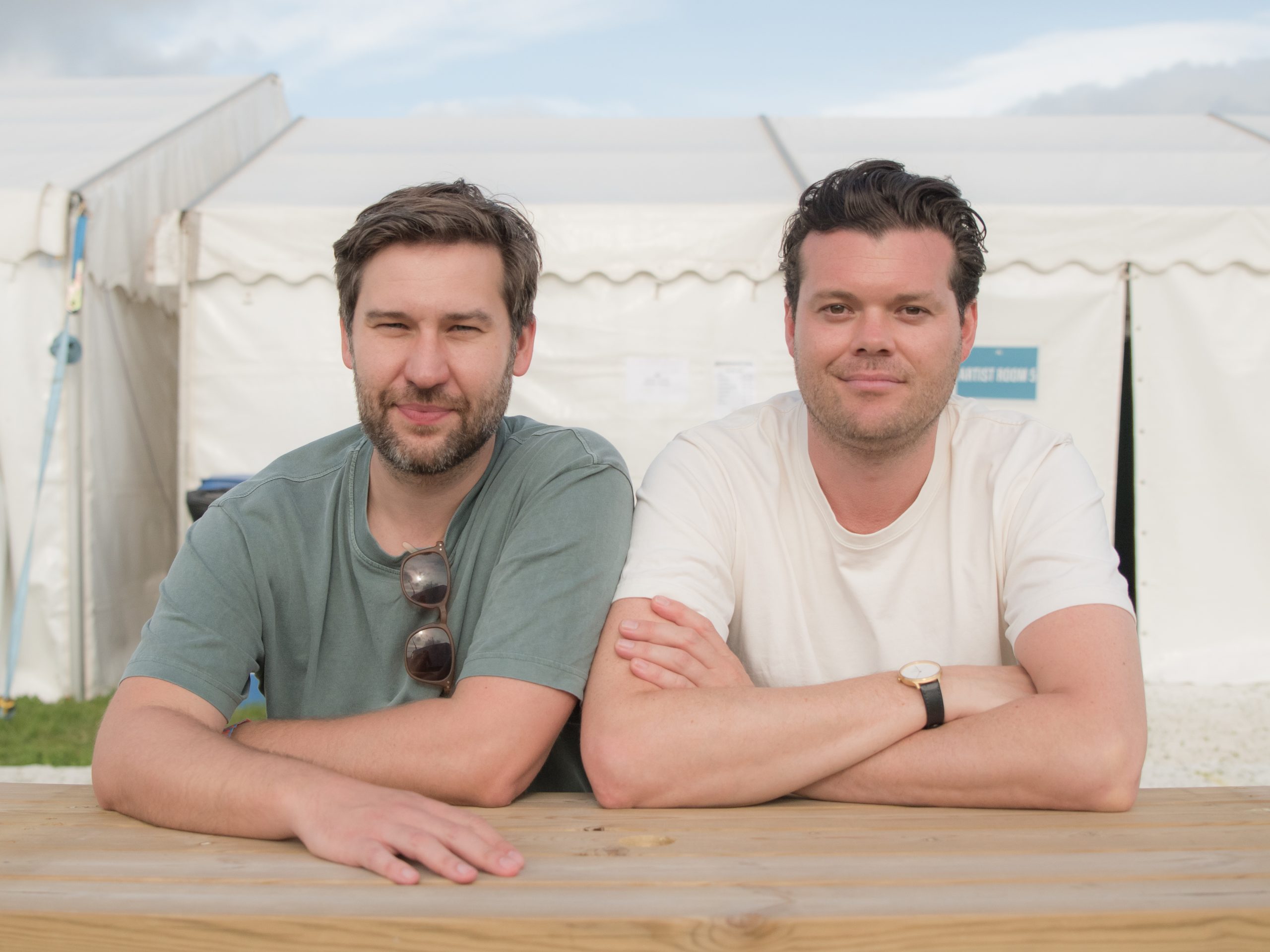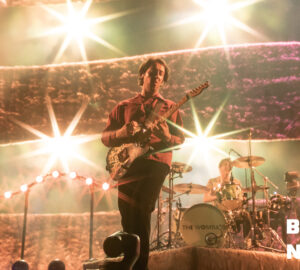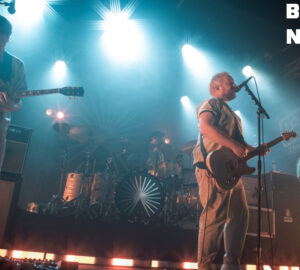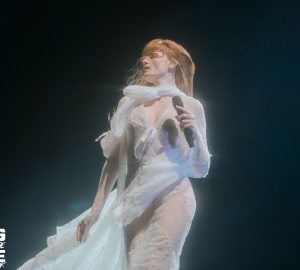Photo Credit: Jack Delve
After their main stage set on the first day of Boardmasters festival in Newquay, Cornwall, we sat down with Jeremy Pritchard and Michael Spearman of Everything Everything to look back on their career and discuss the reissue of their debut album Man Alive, recording their new album, warm-up gigs and more.
Hey Guys! Why don’t you both introduce yourself?
Jeremy: I’m Jeremy from Everything Everything.
Michael: And I’m Michael from Everything Everything.
You had your set earlier, nice sunny weather! How do you think it went?
J: I really enjoyed playing, it was a nice crowd. We’ve played here a lot. We’ve played the main stage maybe three or four times and you always get the view over the sea that the punters don’t get so it’s a very beautiful vista for us from the stage.
M: Yeah, it’s nice to play outside, we’ve been in a lot of tents this summer. Which we do like as well, but it’s a nice change.
You played a warm up show in Exeter at the Phoenix last night, great venue by the way! What made you choose Exeter?
J: Well, we have a friend there who books shows who we know from booking shows in Manchester. He knew we were on our way down to Boardmasters and he just wanted to put us on. This hasn’t been intentional but that venue has always ended up being a testing ground for us one way or another because we first played there when we were debuting material from our third album, which was called Get To Heaven, and it was the first place we played any of those songs. And then when we came back there last year, it was the first time we had been playing a lot of our newest album. And then last night we played loads of songs from our debut album that we hadn’t played in years and years. So, it’s ended up being something of a sort of ‘amongst friends’ stronghold for us.
M: I feel like Exeter has got a good culture to it that kind of welcomes a bit of experimentalism.
J: I mean definitely! We had this amazing Cornish band supporting us called KLEN who are just like sheer experimentalism really. I don’t know how to describe them actually. It was really nice to have some of that. You know, we quite often talk about this, exciting things happen on the edges. Like where these guys come from in Northumberland is like borderlands, and it’s close to the sea.
M: Yeah.
J: When you’re on the periphery of something, things get quite weird and interesting, and that happens in Cornwall and Devon, I think.
M: It happens in Northumberland.
J: It happens in Wales and a lot in Scotland. All those kind experimental bands we really love, there’s something in the water!
We wanted to ask a question about your most recent album, Raw Data Feel, released last year. Jonathan and you guys used AI to help write it, do you have a take on the increasing controversy about AI taking jobs away from creatives?
J: It’s funny! What we did is, Jon fed some information into a machine learning thing and got it to spit out some words and he kind of used some of those words as a jumping off point for himself, as a way to put a spin on the lyrics. When we’re six albums in, you need to have some other kind of creative catalyst.
M: Shake it up a bit.
J: There was no AI used or involved in the music.
M: Although we did, for the artwork, use AI and we talked about it at the time, we were like, we’re just on the edge of the capabilities of what this is at the moment and then became whatever that program is. We don’t actually own a computer so we’re not quite used to it! It became a few months later, like, oh, you can just say this and this in the AI.
J: And it just moves so fast, that was the remarkable thing.
M: Yeah. But I think in terms of something like the actor’s strike at the moment, where they’re talking about taking someone’s likeness.
J: Yeah! And they’re just using them as an item!
M: It needs to be regulated, doesn’t it? There are definitely pros and cons.
J: It just seems so unexciting. The thing that is exciting about art is it’s not just the product, it’s the people that make it and wanting to know about those people. The stuff I love most of all, there’s a personality that you wanna know more about. There’s something ambiguous and unknowable that you want to delve into. Otherwise, it’s just like buying chart singles. You don’t really care who they’re buying. You just want to have a diversion for two and a half minutes.
M: Yeah, it’s interesting.
J: I’m sure it’ll have a place in that regard but I don’t think it can really go the distance.
M: I think, like, Netflix are using algorithms to figure out what they’re gonna do next, which feels like a very bland thing to do. For us, it actually injected some chaos into the writing process because it was like, what’s it going to come up with? That was actually quite creatively stimulating.
J: That’s the difference really, isn’t it? I think it’s this newer iteration of controversy around AI is because it is predictable and bland and selling back to you the stuff you’ve already consumed. Whereas for us, the way we dipped our toe into it was as you say, it was real, it was something chaotic. It was something we couldn’t control and that was exciting.
M: And also, we didn’t specify what was Jon and what was AI. Some of the time we heard some lyrics and we’d say that’s an odd phrase and sometimes it wasn’t directly from the AI but he filtered it through his own brain. It was just a very unique process to be involved with.
And almost alongside your last album, you released the book, Caps Lock On. Almost a lyric book but it’s also an archive of everything. Obviously as you release more albums and music in the future, will there be reissues?
M: [Laughing] Volume two yeah! It’s so interesting with books because we’re so used to Spotify where you can just add to your discography and then with books, you’re suddenly printing the thing.
J: It’s finite.
M: I don’t know. I Thought it felt a bit odd in a way, it felt like quite a permanent thing to do. Not in a bad way.
J: It’s inevitably restrictive. You’ve got to draw the line somewhere if you’re going to do something physical.
M: We did put the new album in it.
J: We were working on the two together, yeah. And they came out at the same time so it’s as up to date as it can be but it will inevitably be out of date, probably next week! But it was also the first point in our career where we actually turned round and had a look just once, back. And it was fifteen years, it felt like a certain decade and a half.
M: Also, it was lockdown and we were kind of things that we could kind of do really. We tried to make it a kind of scrapbook approach. I don’t really like the word career but how our time as a band feels to me, is slightly messy.
J: We wanted to make it something that was photographs that we had taken ourselves for the most part, not entirely, and not just like posed pictures. Nothing that was sort of self-aggrandising because we don’t feel the need to do that. If you google image search Everything Everything, all those pictures are there and we didn’t think we needed to put that on paper really. It was stuff that people hadn’t seen like pictures of me in the van, the was more interesting to us, texturally.
M: At first it was just going to be a lyrics book, it was going to be quite straight really. It just felt a bit dry. We just wanted to have a bit of colour to it, and a little bit of context.
You’re reissuing your debut album, Man Alive.
J: That’s the other thing we’re doing! [Laughs] We’re retrogressing. We’ve allowed ourselves these two moments!
It seems like a strange time to re-release. Thirteen years?
M: Yeah.
J: Yeah, that thing happened in 2020 for two years! There was something awkward about it and unlucky and teenage and I kinda liked that.
M: Thirteen feels appropriate for that album.
J: That has been an interesting process as well. We’re now at a point in our career where there’s a curatorial aspect as well as a creative one and I really enjoy it for the most part.
M: Yeah it’s fun!
J: It’s good that we have both arms, I think.
Silly question next, will the reissue reignite the fence/face argument?
J: The book covered that!
M: Well the book covered that! You’ll have to buy it! That’s the first page people go to! [Laughs]
J: What we actually did was print one word over the other because that is the truth, we did just sing both. Because there was three of us singing that line, we didn’t consult on when we would sing what. It is blurred. It’s a no!
M: The reissue’s got plenty of skeletons in the closet though, I would say. There are lots of demos and half-written things. I think people will like the lore. It goes quite deep, I think, because it’s not just an album reissue, it’s the whole history of our band and how we got up to that point of releasing an album. There’s actually more, even, than we put on there. We were just digging through old demos and trying to think of what people are gonna enjoy the most and what’s fun for us as well, I think.
J: And what shows the sort of the through line of development I suppose. We wouldn’t have been able to do that at the time, we were too close to it. Now we can look back and because it’s like studying other people’s work it does feel like looking at a different group of people, people you used to know, and putting their stuff out. That’s the best way of looking at it.
And you’re currently recording the next album?
J: Yeah! We had a very long meeting today on the bus, to decide about the track listing and stuff. We’re quite far through.
M: Quite far along, yeah!
J: It was inconclusive!
M: [Laughing]
J: We’ve made a record and we’ve mixed it and now at this stage you’ve gotta master it and decide what songs to put on it and in what order, so we’re excited about that. We only started it fractionally less than a year ago and we didn’t know what we were doing at that time, we just wanted to go and record three songs and we’d realised that we had accidentally started an album three months after putting one out so we just carried on. It’s been a different way to make an album.
M: The guy who mixes our records has a studio and he always wants to get us down there, not as a favour but to just see what it’s like.
J: It’s like a spa holiday with a control group!
M: We enjoy being there, it’s got geese and stuff!
Where have you been recording it?
J: We did bits of it there in Suffolk and some of it in the studio we used for Raw Data Feel, this place called Eve, and Get To Heaven! It’s got both extremes on it. Eve is a proper sort of tumble-down old vicarage, full of old BBC gear, and you can stay there. It’s like a family home with a studio in the basement. Martin, who owns and runs the place, became our sort of surrogate dad. When you’re there, you’re doing all of the cooking and stuff for yourself so it’s a very family vibe. And then you go to decoy in Suffolk and it’s like, there are geese, and a vineyard! Eve is the other extreme so I’m glad that we have both represented on the record.
What sort of sound can we expect?
M: I think it’s quite similar, almost a continuation tonally and sonically. We’re always trying to work quick, sometimes too quick! We’re like “Are we doing okay? Is this happening?”
J: We get to know the songs after we’ve recorded them.
M: Yeah, it’s very instinctual. I wouldn’t say it’s a blank page when we start.
J: There are not very many words on it.
M: We’re relying on our instincts. You know, we’ve made a few records now and we sort of know what to do and how to do it.
J: It’s quite a nice experience of making those two albums, Raw Data Feel and this newest one, because they’re broadly similar so it does inevitably feel like part one and part two although I probably shouldn’t have said that because it definitely isn’t it.
M: There’s some connective tissue.
J: Yeah, and there’s quite a nice feeling of being just the four members of the band and our engineer Tom, and sometimes Martin who owns the studio. It’s nice when it’s just five or six people locked away. It’s like there are no grown-ups, we’re left to our own devices.
M: There was also no cut off time. We’d get to two in the morning and we were like “Yeah, that’s probably enough!.”
J: Yeah!
M: When things get weird!
J: We were above the shop too so we couldn’t really escape! It’s good to do that. In the old days we’d make records and have a really intensive tracking session and go to a farm and go mad for five weeks. These days we just do five day spurts a few weeks apart.
And finally, what’s next for the band in the next few months?
J: We’re doing a few more festivals and we’re going to America in October and we will have to start thinking about the presentation of another record. The seventh album! We will have to start thinking about videos and stuff like that soon so yeah, just the other end of the carousel!
Interview By: Jack Delve
Everything Everything have re-released their 2010 debut album Man Alive in standard and deluxe edition – available to stream and purchase HERE.





